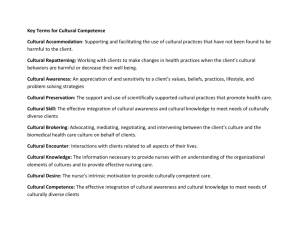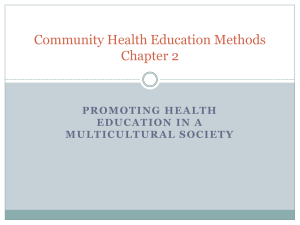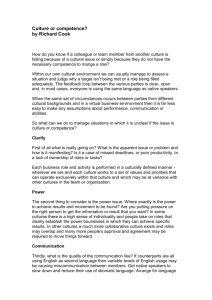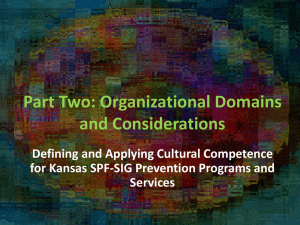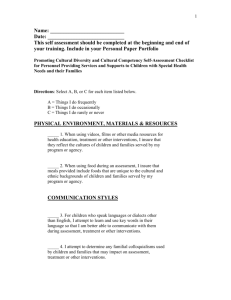C A M ULTURAL
advertisement
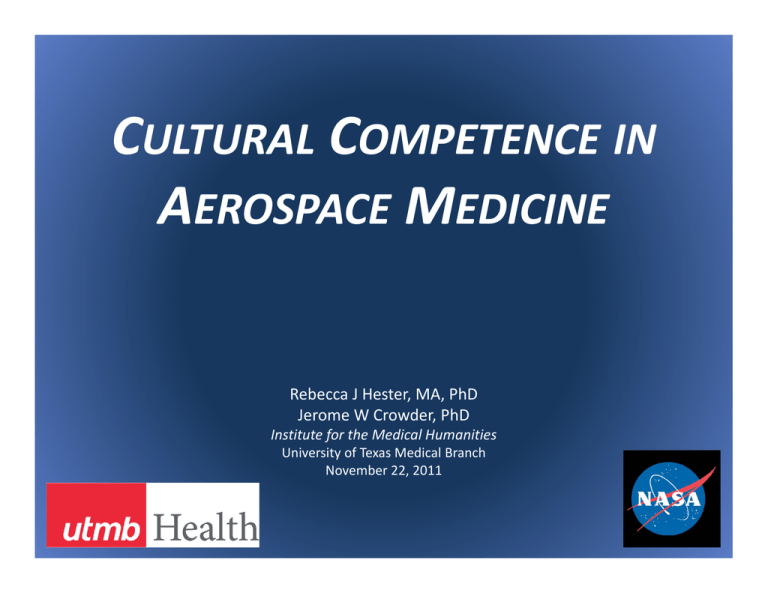
CULTURAL COMPETENCE IN AEROSPACE MEDICINE Rebecca J Hester, MA, PhD Jerome W Crowder, PhD Institute for the Medical Humanities University of Texas Medical Branch November 22, 2011 Objectives Explain the ethical importance of adopting a culturally competent approach in Aerospace Medicine Recognize opportunities and challenges for becoming a more culturally competent medical provider Integrate culturally competent and ethical approaches in the practice of Aerospace Medicine Emergence of CULTURAL COMPETENCE Civil Rights movements in the United States Global movement for Primary Health Care Increased knowledge of and attention to the link between social inequities and health care Report of the Secretary’s Task Force on Black and Minority Health, 1985 Institutionalized by congressional mandate in 1994 with the creation of the Office of Minority Health Continued Salience in the U.S. Increase in chronic diseases Rise in health care costs Patient‐centered care and satisfaction (Crossing the Quality Chasm 2001) Continued health disparities (Unequal Treatment 2002) Globalization/Population mobility Defining CULTURE COMPETENCE A set of congruent behaviors, attitudes, and policies that come together in a system, agency, or among professionals and enables that system, agency, or those professionals to work effectively in cross‐cultural situations (Cross, Bazron, Dennis & Isaacs 1989). What does CC look like in practice? Operationally defined, Cultural Competence is the integration and transformation of knowledge about individuals and groups of people into specific standards, policies, practices, and attitudes used in appropriate cultural settings to increase the quality of health care; thereby producing better health outcomes (Davis 1997). Ethics of CULTURAL COMPETENCE What is the underlying agenda of Cultural Competence? Acknowledgement of the importance of culture Respect for cultural differences Minimize negative consequences of differences (Paasche‐Orlow 2004) Various Approaches Cultural Sensitivity/Awareness Cultural Competence (Cross, et. al. 1989) Transnational Competence (Koehn 2006) Cultural Humility (Tervalon & Murray‐Garcia 1998) Cultural Safety (Papps & Ramsden 1996) Critical Consciousness/Insurgent Multiculturalism (Kumagai, et. al. 2009; Wear 2003) National Standards on CULTURALLY & LINGUISTICALLY APPROPRIATE SERVICES (CLAS) There are 14 standards, 4 of these are mandates CLAS mandates are current Federal requirements for all recipients of Federal funds: language accessibility Other standards focus on respectful care, staff diversity, record keeping, transparency, policies for meeting CLAS, self‐assessment More information can be found at: minorityhealth.hhs.gov Why focus on CULTURAL COMPETENCE? Prejudice, stereotypes and biases inform health inequities in U.S. society‐often arise around cultural issues There are many medical systems, health practices and biomedicines in the world Medical pluralism, complimentary alternative medicine Not all people have the same understanding of health, well‐being, sickness, illness, disease and the body Why focus on CULTURAL COMPETENCE? People have different expectations of health institutions, policies and practitioners Increased mobility and migration of people all over the world Diagnostic Procedures Treatments Why is CULTURAL COMPETENCE important for AEROSPACE MEDICINE? Professionalism Documented cultural challenges in Aerospace Different orientations to time, space, and the body can be interpreted differently with research and health implications Why is CULTURAL COMPETENCE important for AEROSPACE MEDICINE? Science community is diversifying: STEM program equal opportunity and diversity inclusion initiatives more international partners Long‐duration and commercial space flight bring new challenges The stakes are high in Aerospace National Diversity within ISS crews Country Fliers Women Tourists USA 138 27 5 Russia 37 0 0 Canada 7 1 1 Japan 6 1 0 Italy 3 0 0 France 3 1 0 S. Africa 1 0 1 S. Korea 1 1 0 Countries not represented include: Germany, Belgium, Brazil, Sweden, Malaysia, Spain and the Netherlands A Variety of CULTURES at NASA National Scientific Military / Civilian Institutional Ethno‐linguistic Commercial OPPORTUNITIES & CHALLENGES for NASA On the ground Research ethics In‐flight ON THE GROUND Issues Aerospace Medicine is concerned with the health and well‐being of ALL NASA employees Many “traditional” concerns, higher stakes o Access to care o Effective and respectful treatment o Racial concordance o Under/over‐treatment ON THE GROUND ISSUES Special Issues related to Research Ethics: Potentially harmful research practices on the ground to improve space flight Flight crews participating in research and countermeasure development (Shepanek 2005) Confidentiality‐HIPPA IN‐FLIGHT Issues National cultures and languages Orientations to time, space, the body Space Fog, adaptation rates Interpersonal issues Crew tension, cohesion, leadership, displacement (Kanas, et. Al. 2000) Medical models Eastern vs. Western influence Issues of POWER: Translated through a CULTURAL LENS Social hierarchies – gender, race, class, management styles, etc. Politics – national political agendas and political models Economics – funders/customers, resource allocation *Exacerbated by environment, observers, duration How to Become a More CULTURALLY COMPETENT Practitioner? Recognize that there are multiple cultures being negotiated simultaneously Both practitioners and patients operate in many cultures Ask yourself what your cultures have taught you (Lock, Kleinman & Taylor 2003) How to Become a More CULTURALLY COMPETENT Practitioner? Cultivate continual, critical, self‐reflection What are my assumptions about what humans should know or how they should act? How do I use Science to avoid dealing with complex social, cultural and economic issues? How much of my patients’ behaviors are individual? Cultural? Structural? How to Become a More CULTURALLY COMPETENT Practitioner? Do I have commonalities with my patient? Can I live with uncertainty and try to avoid negative stereotyping? How to Become a More CULTURALLY COMPETENT Institution? Value and promote diversity Have the capacity for cultural self–assessment What are the cultures operating in Aerospace Medicine? How do they work? Be conscious of the "dynamics" inherent when cultures interact What happens when someone from a collectivist culture interacts with someone from an individualist culture? How to Become a More CULTURALLY COMPETENT Institution? Institutionalize cultural knowledge by developing adaptations to service delivery that reflect an understanding of diversity and dynamism between and within cultures. Best Practices in CULTURAL COMPETENCE Collect and track data on the populations you serve Educate yourselves about heath disparities and cultural challenges in your institution Make all of your policies at every level Culturally Competent Things to Think About Enthusiasm, curiosity and engagement patient‐centered Trust, communication, and relationship‐ building are key to providing C.C. care Some cultural issues cannot be translated and may not be able to be overcome What are the ethical issues related to cultural differences? value of time, respect for authority, belief systems THANK YOU! rjhester@utmb.edu jw.crowder@utmb.edu For a copy of our bibliography or other references please send us an email.
